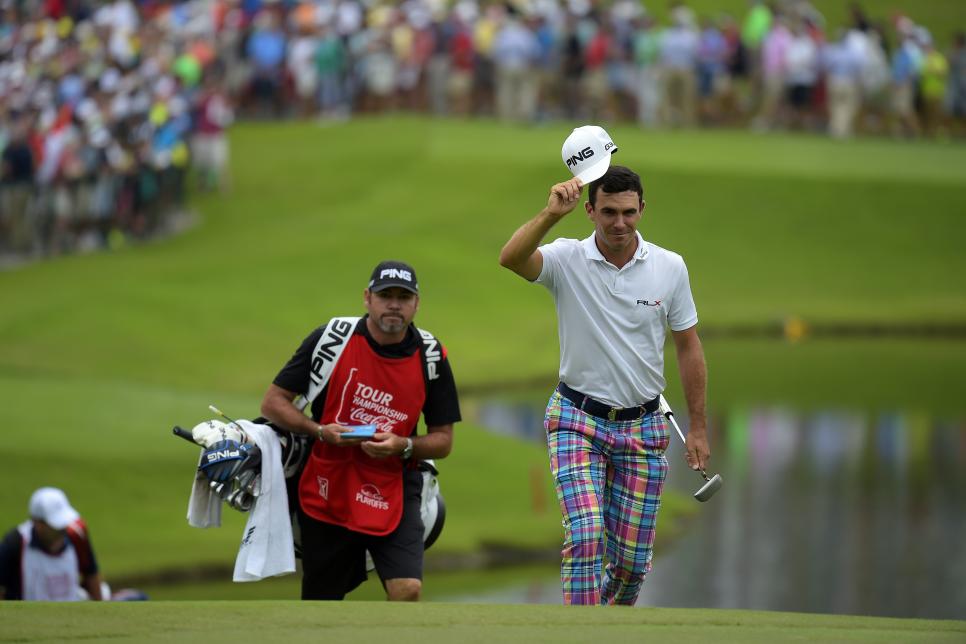The PGA Tour's FedEx Cup begins this week. Now in it's ninth year of existence, even proponents of golf's month-long playoff format will concede the results have been mixed.
Luckily, there's hope on the horizon, in the form of advice from the "Big Four" of American sports. Here's what golf can learn from the postseasons of baseball, football, basketball and hockey:
Football
There are a myriad of reasons why the Super Bowl is our country's biggest sporting event, one of which is its spot on the calendar. FACT: February is the worst. It is the Natty Ice of months, so devoid of happiness and passion we had to manufacture a holiday of love (Valentine's Day). The Super Bowl, even for non-pigskin partisans, is a life vest for those drowning in this sea of sadness. FINALLY, a reason to get out of the house and do something.
Which brings us to one of the chief problems of the FedEx Cup. There's too much going on in the sports universe during the culmination of golf's postseason. The beginning of college and pro football, baseball's playoff race and the beginning of basketball and hockey camps. Our proposal: move the event up to August. Nothing goes on in August. You have the NFL preseason (ugh) and the Little League World Series (don't get us started).
Sure, the PGA Championship is historically during this period, but, as it's moving to July in 2016 to accommodate the Olympics, clearly that date is not sanctified or set in stone. Instead of wrapping up in the final days of September or early October, August should be the end date for golf.
One other facet golf can imitate from football's Super Bowl: a rotating championship host. Since 2004, the Tour Championship has been at East Lake Golf Club in Atlanta, Georgia. The PGA Tour should mix it up, showcasing different courses around the country. This falls in line with the tour's practice to other FedEx Cup events; The Barclays has been played at five different courses in its nine-year history.
Baseball
Small caveat -- baseball has shown what NOT to do. The duration of last fall's MLB playoff games were, on average, 20 percent longer than a regular-season contest. A problem, giving the shortened time span of today's viewers. In a related note, TV ratings for the World Series continue to exhibit a Paula Dean-like popularity plunge.
Ways golf can present its coverage in a more condensed window: tape delay the leaders' first four-five holes, fewer full-screen commercials, harsh penalties for slow pace. If the common golfer can complete a round under three hours, a professional should be expected to do the same.
Hockey
Playoff beards.
Enough said. I'm also for fighting, but instead of a penalty box, the loser adds a stroke to his card. Definitely would make Boo Weekley a suddenly-viable contender.
Basketball
More than its athletic counterparts, the NBA does a tremendous job -- thanks to seven-game series and home-court advantage -- of facilitating its premier teams to go as far as possible in the playoffs. Rarely do you see a club in the championship that wasn't one of the best six teams during the regular season.
Unfortunately, golf's FedEx Cup cannot say the same. Billy Horschel, bless his heart, got hot at the right time to win last year's title. In that same vein, it felt bizarre that the playoff winner failed to place in the top 20 in any of the 2014 majors. Similar sentiments can be said for Bill Haas and Brandt Snedeker in their respected championships.
The FedEx Cup needs to be more of a "best of the best" competition. In its current configuration, it's a wild-card affair. The Tour Championship needs to place emphasis on the regular season's outcomes rather than the previous three weeks.
Golf is a sport of tradition. It needs to fix the FedEx Cup before the event's legacy is one of indifference.


